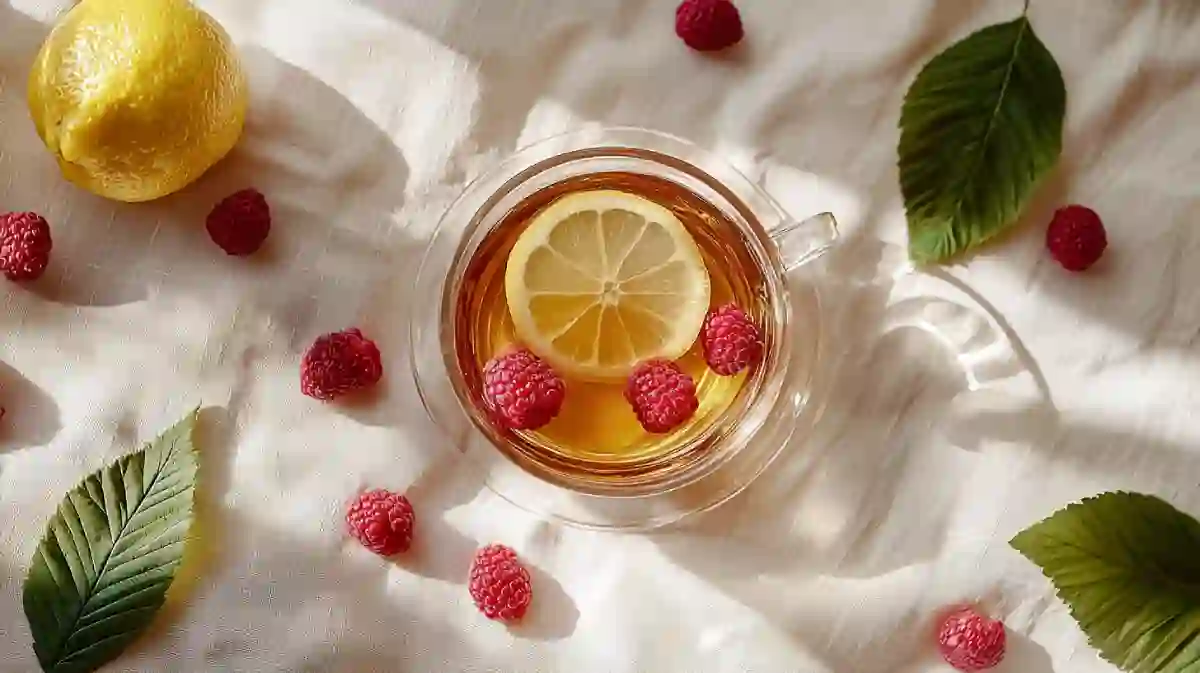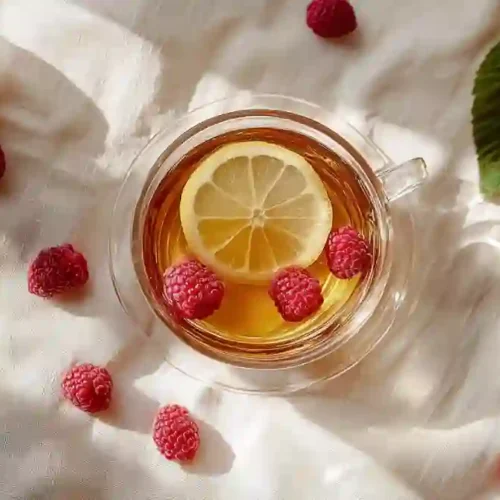
Table of Contents
Curious about the calming power of raspberry leaf tea drink? After steep-testing three leaf-to-water ratios, I landed on a mellow brew that delivers earthy berry notes plus a soothing mineral boost in just ten minutes—ideal for daily wellness or a relaxing evening wind-down.
What Is Raspberry Leaf Tea?
Raspberry leaf tea drink comes from the dried leaves of the red raspberry plant and has been a favorite for centuries. It offers a subtle, earthy flavor and several health benefits. Unlike raspberry fruit teas, which are sweetened with berries, raspberry leaf tea focuses on natural simplicity and wellness.
This tea contains Vitamin C, iron, and magnesium, making it a healthy addition to your diet. Many people choose it for its potential to support women’s health, among other benefits. As you will see in the following sections, this tea is much more than just a comforting beverage—it is a nutrient-rich option that fits into a variety of lifestyles.
You can easily prepare raspberry leaf tea by steeping the leaves in hot water. It is widely available in health stores and online, making it accessible for anyone looking to add it to their daily routine. People love it as a caffeine-free alternative to coffee or black tea, and its natural origin appeals to those who prefer wholesome drinks.
By drinking raspberry leaf tea, you enjoy a long tradition of health and simplicity. Its growing popularity highlights how versatile it is, making it a go-to choice for tea lovers around the world. From its unique origins to its various benefits, raspberry leaf tea can easily become a staple in your wellness journey.
Health Benefits of Raspberry Leaf Tea
The raspberry leaf tea drink is renowned for its numerous health benefits, many of which are supported by both traditional use and modern anecdotal evidence. By incorporating this herbal tea into your daily routine, you can experience several positive effects on your overall well-being.
Key Benefits of Raspberry Leaf Tea
- Supports Women’s Health
- This tea is particularly popular for its potential to ease menstrual cramps. It contains a compound called fragrine, which helps tone and relax pelvic muscles. This can lead to reduced discomfort during menstruation.
- During pregnancy, many women use it to support uterine health and prepare for labor. However, it’s essential to consult a healthcare professional before use during pregnancy.
- Boosts Digestive Health
- Raspberry leaf tea may help relieve common issues like bloating and indigestion. Its mild diuretic properties can also reduce fluid retention, promoting a lighter, healthier feeling.
- Rich in Antioxidants
- The tea contains polyphenols, such as tannins and flavonoids, which help protect your body from oxidative stress and inflammation. These antioxidants also support a stronger immune system.
- Relieves Throat Discomfort
- Used as a natural remedy, this tea can soothe sore throats and mouth ulcers when consumed or used as a gargle.
For an in-depth look at these benefits, you can visit BBC Good Food’s article on raspberry leaf tea.
Incorporating raspberry leaf tea into your diet not only provides these health advantages but also aligns with a natural and holistic approach to wellness. Its versatility and ease of preparation make it a favorite for many. As always, listen to your body and consult a healthcare provider if needed.
How to Prepare Raspberry Leaf Tea
Making a delicious raspberry leaf tea drink is both simple and rewarding. The process enhances the natural flavors of the leaves, and whether you are using fresh or dried options, you’ll find the steps easy to follow. With just a few ingredients and a little time, you can enjoy this nutritious tea.
Ingredients
- 1 tablespoon of dried raspberry leaves (or 2 tablespoons of fresh leaves)
- 1 cup of water
- Optional: honey, lemon, or other natural sweeteners
Step-by-Step Instructions
- Gather Your Ingredients
First, ensure you have high-quality raspberry leaves. If you’re using fresh leaves, rinse them well under running water to remove any dirt. Dried leaves can be used straight from the package, but always choose organic options for the best flavor and health benefits. Sweeten your cup naturally with a swirl of tangy sumac sauce for a citrus-berry fusion. - Boil the Water
Next, bring your water to a boil. For every cup of tea, you will need one cup of water. While the water heats, prepare your tea leaves by crushing fresh ones lightly. This step helps release their natural oils, enhancing the tea’s flavor. - Add the Leaves
Once the water is ready, add the raspberry leaves to your teapot or directly into your cup. Then, pour the boiling water over the leaves. Cover the teapot or cup to lock in the heat and aroma. - Steep the Tea
Let the tea steep for 5 to 15 minutes. If you prefer a mild flavor, stick to the lower end of the time range. On the other hand, for a stronger brew, allow it to steep longer. - Strain and Serve
After steeping, strain the tea into your cup to remove the leaves. Finally, you can add honey, lemon, or another natural sweetener to enhance the flavor. Whether you drink it hot or cold, this tea is a refreshing treat.
Tips for the Perfect Brew
- Always store dried leaves in an airtight container to preserve freshness.
- To create a unique flavor, experiment by blending raspberry leaves with other herbs like mint or chamomile.
- Use filtered water for a cleaner taste.
Where to Buy Raspberry Leaf Tea
Finding a high-quality raspberry leaf tea drink is simple, as it is widely available in various forms. Whether you prefer shopping in-person or online, knowing what to look for can help you make the best choice for your needs.
Where to Look
- Health Food Stores
Most health food stores carry raspberry leaf tea in either loose-leaf or tea bag formats. These stores often stock organic options, which are free from pesticides and additives. - Supermarkets
Many larger grocery stores also carry raspberry leaf tea in their herbal tea sections. However, it is important to check the label for 100% raspberry leaf content, as some blends include other herbs or flavors. - Online Retailers
Websites like Amazon or specialized tea shops provide a wide variety of brands and options. Shopping online allows you to read customer reviews, compare prices, and ensure you’re purchasing a trusted product.
What to Look For
- Organic Certification
Organic teas are grown without harmful chemicals, making them a safer choice. Look for certifications on the packaging to ensure quality. - Ingredient Transparency
Choose products that list 100% raspberry leaves as the primary ingredient. Avoid teas with artificial flavors or fillers. - Sustainable Packaging
Many brands now offer eco-friendly packaging, which aligns with environmentally conscious values.
Recommended Brands
- Traditional Medicinals
Known for their organic herbal teas, this brand provides a reliable and widely available option. - Yogi Tea
Yogi offers a variety of herbal teas, including a raspberry leaf blend, ensuring both quality and accessibility.
FAQs About Raspberry Leaf Tea Drink
1. Can You Drink Raspberry Leaf Tea Every Day?
Yes, you can drink it daily, but moderation is key. Most experts recommend limiting consumption to 1-3 cups per day, especially during pregnancy. Overconsumption may lead to side effects like mild nausea or digestive issues.
2. Is Raspberry Leaf Tea Safe for Everyone?
While generally safe for most adults, certain groups should exercise caution, including pregnant women in the first trimester, individuals with hormone-sensitive conditions, and those taking medications that may interact with the tea.
3. What Does Raspberry Leaf Tea Taste Like?
The tea has a mild, earthy flavor that is often compared to black tea, but without the caffeine. You can enhance its taste with honey, lemon, or mint.
4. How Is Raspberry Leaf Tea Different From Black or Green Tea?
Unlike black or green tea, raspberry leaf tea is caffeine-free and made from the leaves of the raspberry plant rather than the fruit or tea leaves. It is valued for its health benefits rather than its stimulating properties.
5. Can Raspberry Leaf Tea Help With Menstrual Cramps?
Yes, it is commonly used to ease menstrual cramps. Its natural compound, fragrine, helps relax and tone pelvic muscles, providing relief from discomfort.
6. Does Raspberry Leaf Tea Promote Weight Loss?
While it is not a weight-loss tea, its low calorie content and mild diuretic properties can support overall health and hydration, which may indirectly benefit weight management.
7. What Are the Benefits of Drinking Raspberry Leaf Tea?
Red raspberry leaf tea supports women’s health by easing menstrual cramps and promoting uterine health during pregnancy. Rich in antioxidants, it helps combat oxidative stress and boost immunity. Additionally, its mild diuretic properties aid digestion by reducing bloating and fluid retention.
8. Does Raspberry Leaf Tea Increase Milk Supply?
Raspberry leaf tea is not scientifically proven to boost milk supply but is safe for nursing mothers in moderation. Consulting a healthcare professional is recommended for personalized breastfeeding advice.
9. Can I Drink Raspberry Leaf Tea Every Day?
Drinking 1–3 cups daily is generally safe, but pregnant women should avoid it in the first trimester and consult a healthcare provider. Overconsumption may cause mild digestive discomfort or nausea.
Conclusion
Raspberry leaf tea drink is more than just a beverage; it is a versatile, health-enhancing addition to a wellness-focused lifestyle. Its rich history, combined with its numerous health benefits, makes it a popular choice for tea lovers around the world.
By incorporating this herbal tea into your daily routine, you can enjoy its ability to support digestion, ease menstrual cramps, and even prepare the body for childbirth. Moreover, its naturally caffeine-free and nutrient-rich profile ensures that it caters to a wide variety of dietary needs.
Additionally, sourcing your tea from sustainable and ethical brands allows you to make a positive impact on the environment and support fair practices. Whether you enjoy it hot or cold, raspberry leaf tea is an accessible and beneficial way to prioritize your health while also caring for the planet.
In conclusion, taking small steps like drinking raspberry leaf tea can contribute to a healthier, more balanced lifestyle. Whether you are new to herbal teas or a long-time enthusiast, this drink provides a unique blend of tradition and modern health benefits.

Raspberry Leaf Tea
Ingredients
- 1 cup 240 ml hot water
- 1 tablespoon dried raspberry leaves or 1 tea bag
Instructions
- Boil Water: Heat 1 cup of water to a boil.
- Prepare Tea: Place 1 tablespoon of dried raspberry leaves (or 1 tea bag) into a cup.
- Steep: Pour the hot water over the leaves and cover the cup. Let it steep for 5-10 minutes.
- Strain and Serve: Remove the tea leaves or bag. Optionally, add sweeteners like honey or flavors such as lemon to taste. Enjoy warm.
Notes
- Flavor Variations: For added taste, consider infusing the tea with a cinnamon stick or fresh ginger during steeping.
- Iced Tea Option: To enjoy cold, prepare the tea as directed, let it cool, and serve over ice.
- Pregnancy Consideration: Pregnant individuals should consult with a healthcare provider before consuming raspberry leaf tea, especially in the early stages of pregnancy.
- Storage: Store dried raspberry leaves in an airtight container in a cool, dark place to maintain freshness.
